
Letter from Freiburg
Vegetable tourism is a gift to the world from Todmorden – the birthplace of Incredible Edible. Sustainability tourism? No contest: it has to be Freiburg in prosperous Baden-Wurtenburg, the sunniest place in Germany.
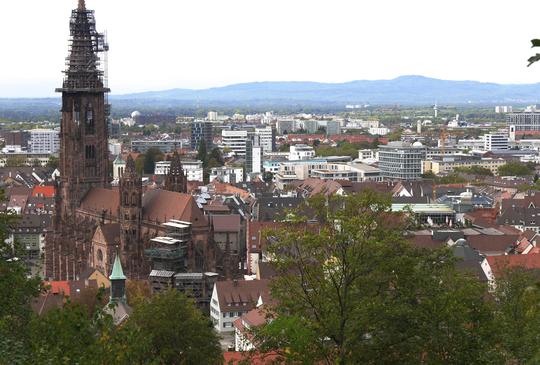
Your correspondent joined the constant stream of sustainability pilgrims to ‘Europe’s Solar Capital’, hurtling at nearly 200mph on the Paris-Strasbourg TGV towards the answer. And the question: lessons for us here in Greater Manchester? Hype? Boosterism? Or is what has been described as “the Freiburg mix” – social, economic and environmental – signposting a future that transcends our current dystopian obsession with growth at any price?
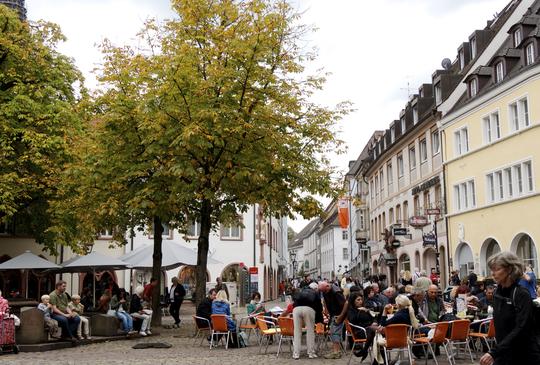
This fine university city was sensitively rebuiltafter massive war damage. Its heart, the Munsterplatz, is alive with a daily farmers market, elderly matrons scoffing towering ice creams and students enjoying the autumn sunshine.
The centre is almost entirely traffic free, a delight to explore in the clean air that we miss in our noisy, polluted, gridlocked urban centres. There is an extensive, comprehensive and integrated tram and bus system. Bikes are everywhere and cycling is normal: Freiburg has an extremely low percentage of car ownership by German standards.
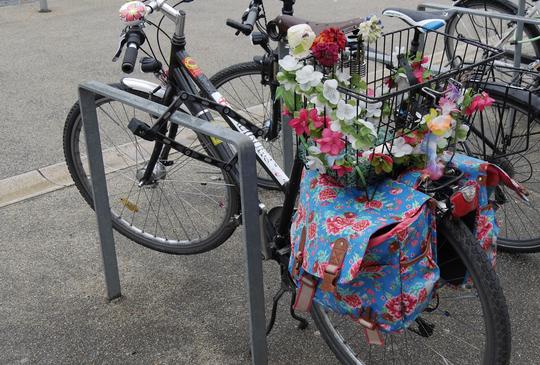
The Tourist Information Centre hands out booklets on Freiburg Green City with a map featuring 29 locations for the sustainability tourist to visit. The blobs on the map range from entire neighbourhoods to specific projects. For example, Heliotrope is claimed to be the first plus-energy house in the world, producing three times more energy than it uses. Quiz question: what would we showcase on the GM green city map (strategies and waffle not allowed)?
Many of the projects embrace solar energy. Solar Fabrik AG claims to be the first ever CO2-neutral, zero-emission factory. The Fraunhofer Institute is Europe’s largest solar energy institute with 1300 staff. There is a significant cluster of solar industries, R&D and SMEs. Seeing is believing but, as ever, things are not always quite what they seem.
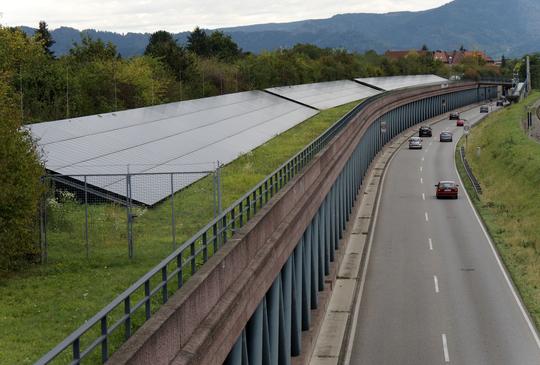
Visiting the inspiring B31 Solar Array – a photovoltaic installation built on top of the B31 motorway tunnel – it emerged that the consenting process had been lengthy and time consuming. While the power being generated exceeded projections and the return on investment was good, practical problems had included availability of panels and the calculated theft of some of the valuable panels soon after installation.
Here, we face the perfect storm of a planning and housing crisis: a government-initiated race to the bottom with attempts to abandon the Code for Sustainable Homes coupled with the lack of choice and poor quality provided by our pixie-shit fixated volume housebuilders. So I was especially excited exploring the much celebrated, new neighbourhoods of Vauban and Reiselfeld.
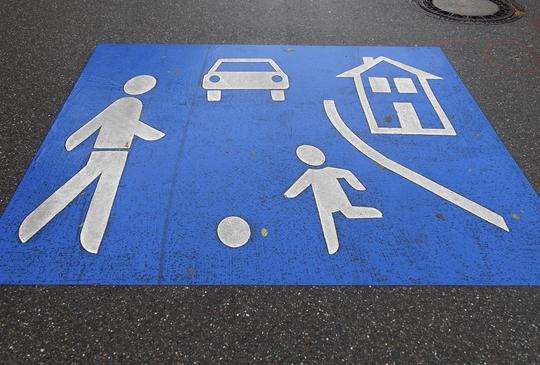
Vauban lies 3km from the city centre, a former military barracks vacated by the French in 1992. The scene of ‘green’ protests and occupation in its early years, design competitions and extensive and contested citizen participation – its story is tangled.
Today, 38ha is fully developed, a dense but verdant mix of residential, commercial and community facilities. Within a clear plan – basically a grid with three types of connector, roads, local streets and cycleways – and finally the tram link to the city centre, there is a rich variety of building types.
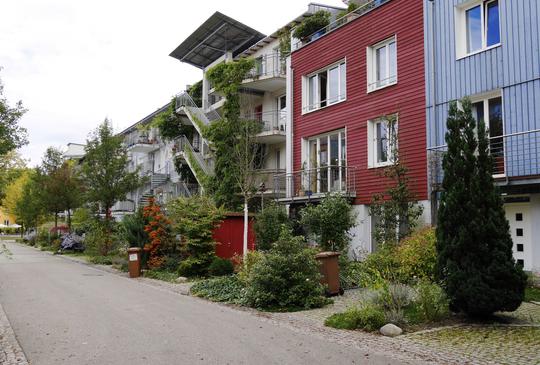
The parking free – stellpklatzfrei – residential streets have been developed by building collectives as well as individual owners and developers. Parking is in district garages. Car free/parking free apartments have financial benefits. The five greenspaces each have their own character, planned with the residents, lush, informal and delightful. Green roofs are a basic planning requirement. A CHP district heating system supplemented by rooftop solar panels powers the neighbourhood.
Reiselfeld, developed mainly between 1992 to 2010, is sited on an old sewage works in what started as an unpromising location next to industrial estates. Its seventy hectares has been growing steadily along the same lines as Vauban. Without the benefits of Vauban’s existing mature trees and existing buildings providing a context, a colourful townscape has been created, softened with greenspace, the traffic calmed with conviction. It, too, is a model mix of residential, commercial and community development.
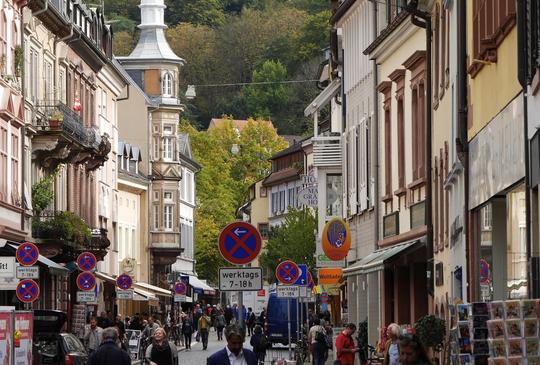
By any estimation, Freiburg is a liveable city with a quality of environment and life that is so alluring that it attracts footloose people and businesses who choose to settle there. It is at the opposite end of the spectrum from the anonymous, anytown, anywhere NEF clone towns that typify 21st Century Europe. How can this be? Are Freiburgeois more intelligent, civilised, educated and far sighted than us? Are their leaders more visionary? Is the answer to be found in local green politics evolving from protest to electoral success? Or in the compelling big idea – Europe’s solar capital? Or a combination of these and many other elements in ‘the Freiburg mix’?
We know, from evidence around the world, that a critical factor in successful, prosperous cities is quality of environment and place. Green and blue infrastructure is as important as transport, energy, digital. This means pro-active, strong, visionary planning and urban design. It needs ‘alternative institutional and financial models such as the building collectives in Vauban and Reiselfeld.
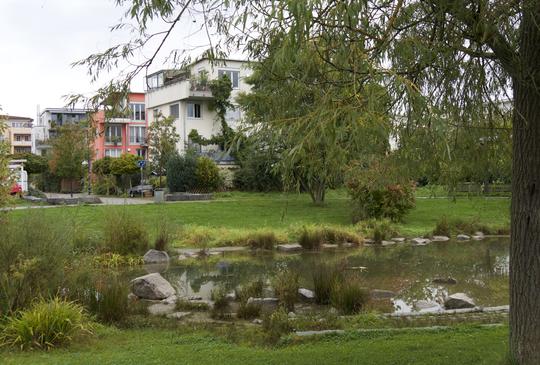
Freiburg (the greenest city in Europe?) shows that there are far superior possibilities than our defeatist acceptance of lowest common denominator placemaking. Could Greater Manchester’s new statutory development plan for the whole city region – the first city region scale spatial plan – be the opportunity? Could it be an ambitious, intelligent, progressive blueprint towards a sustainable future? The first step? An intensive session for our council leaders, chief executives and heads of planning in, yes, you’ve guessed: Freiburg.
Thanks to Richard Elsner of Pivotal Moment and Dr. Josef Pesch of FESA gmbh for their valuable insights. The views in this letter are entirely my own. Sustainable Freiburg has been extensively researched and written about. A good starting point is the website of the Green City Office.
Adapt and thrive: Greater Manchester joins roster of EU cities adapting to climate change
Contributed by Steve Connor
Contributor Profile
Walter Menzies was an independent advisor on sustainable development and partnership development and management with the public, private and third sectors. He was chair of the Manchester and Pennine Waterway Partnership (of the Canal and Rivers Trust) providing leadership, championing and developing a strategic plan for Manchester and Pennine area, provisionally titled: “Manchester - Capital of the North’s Waterways?”.




